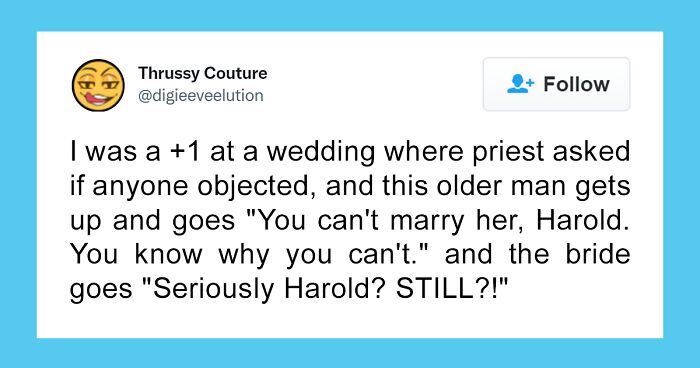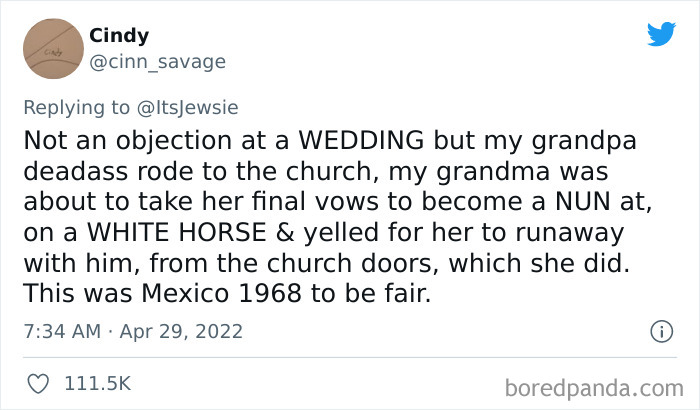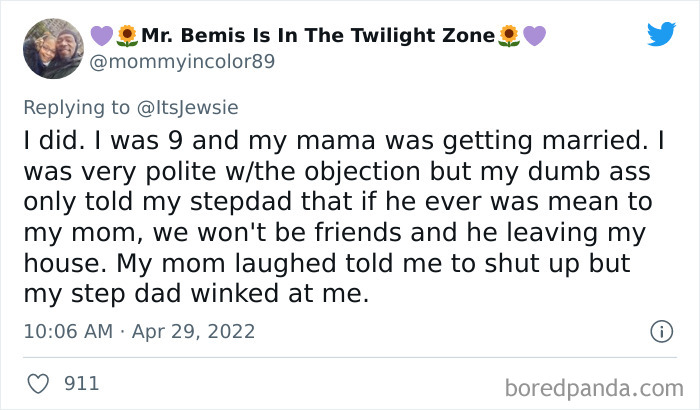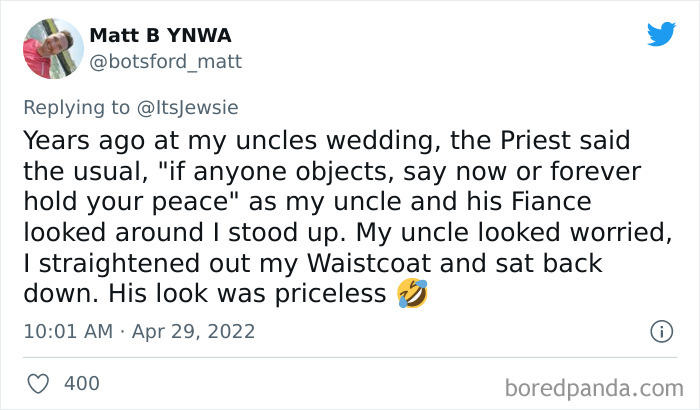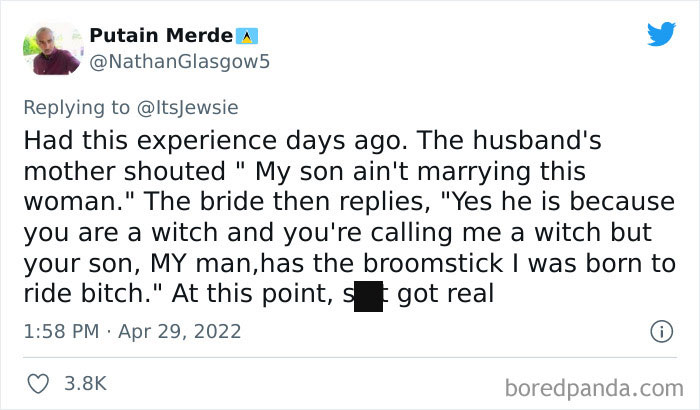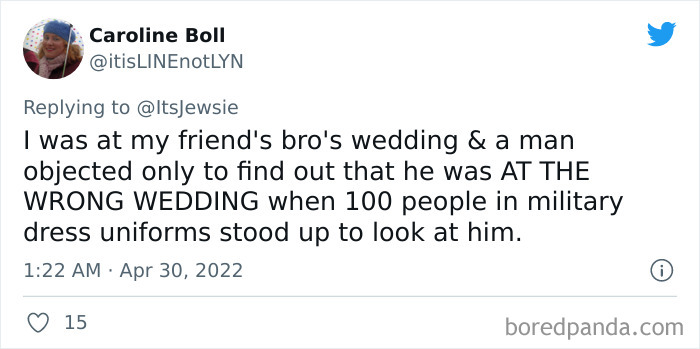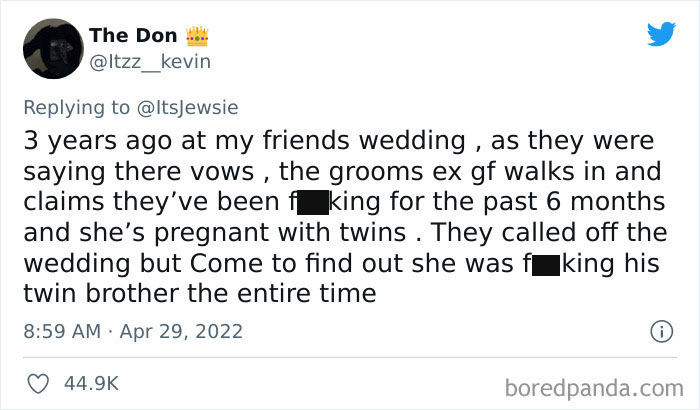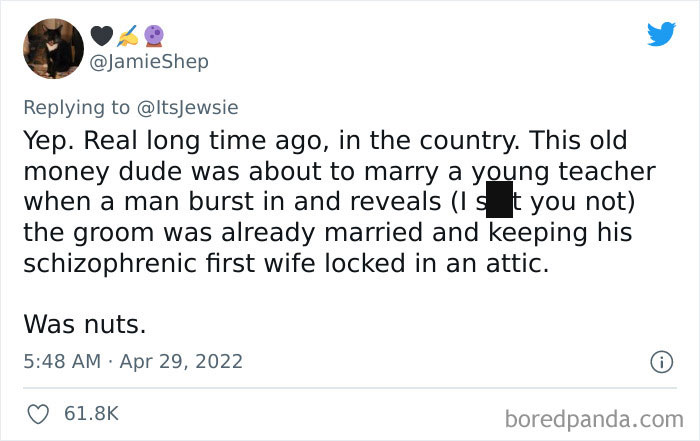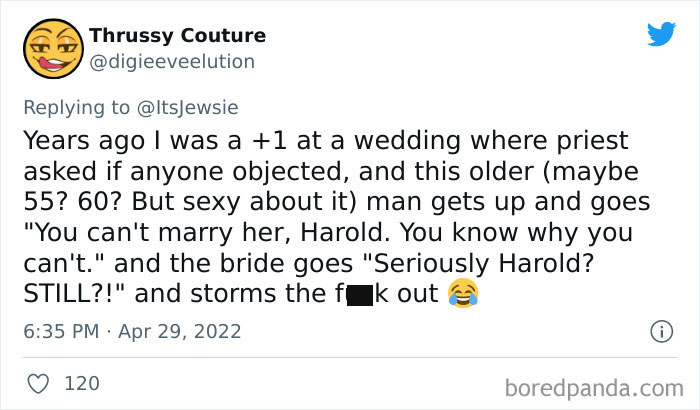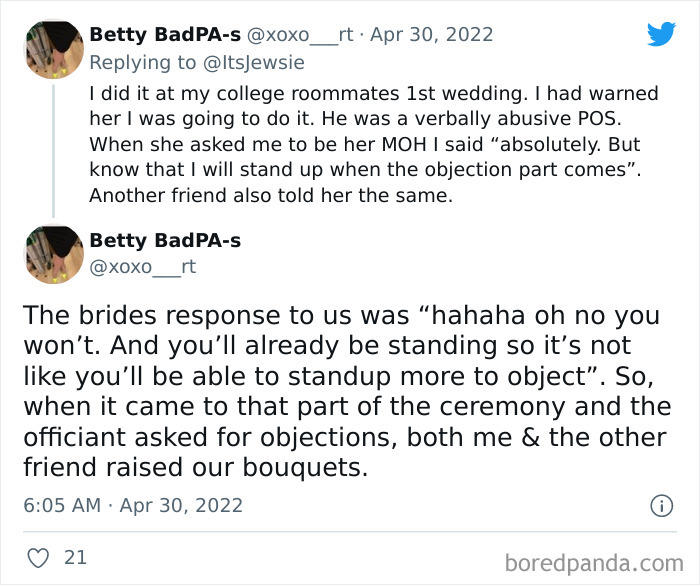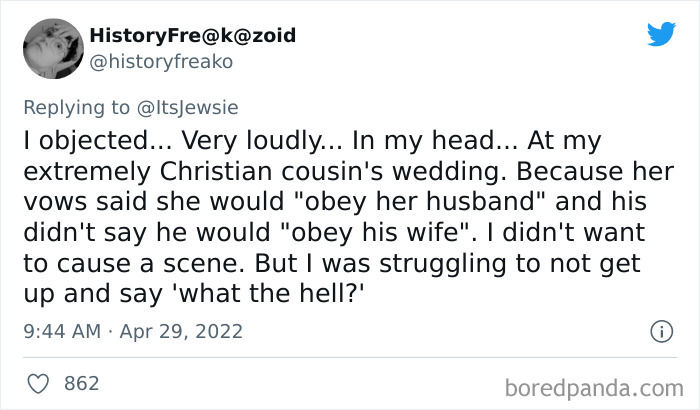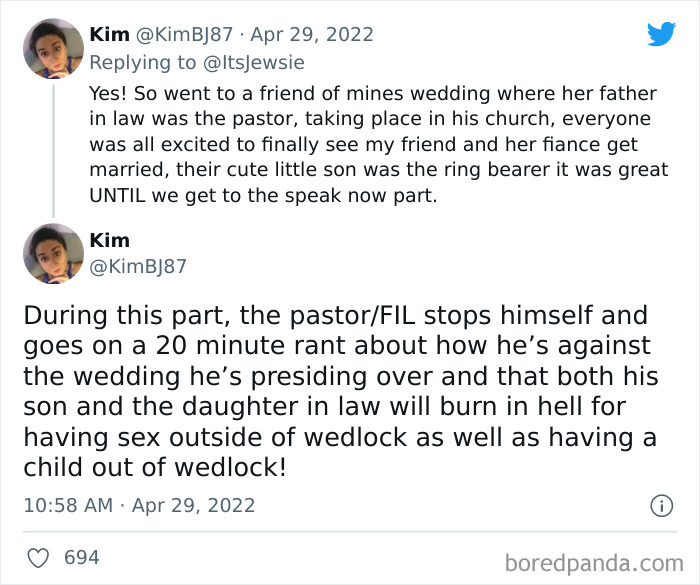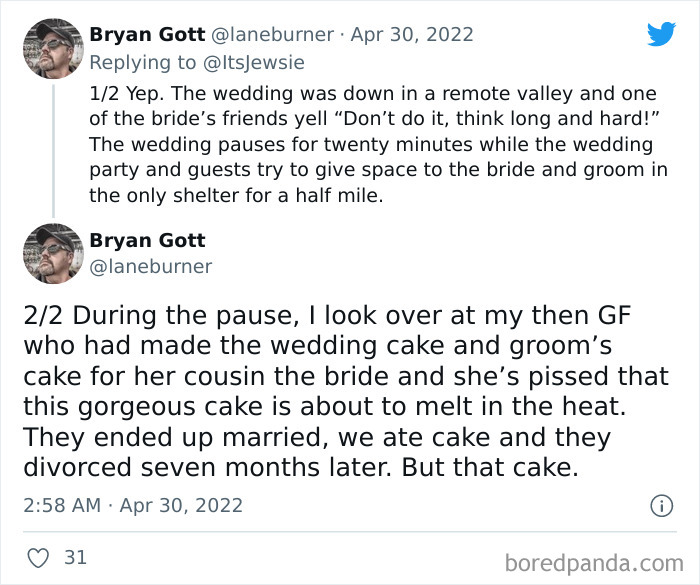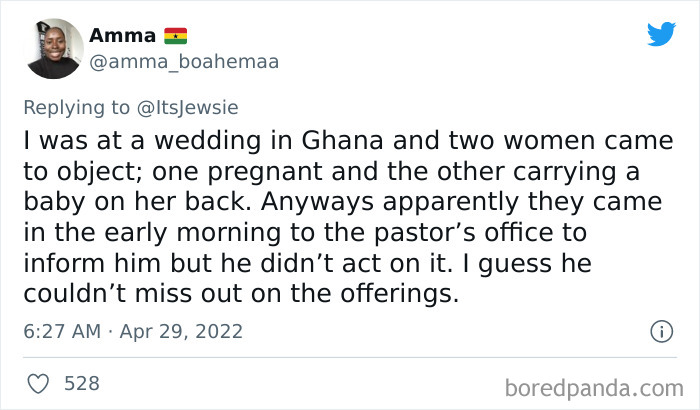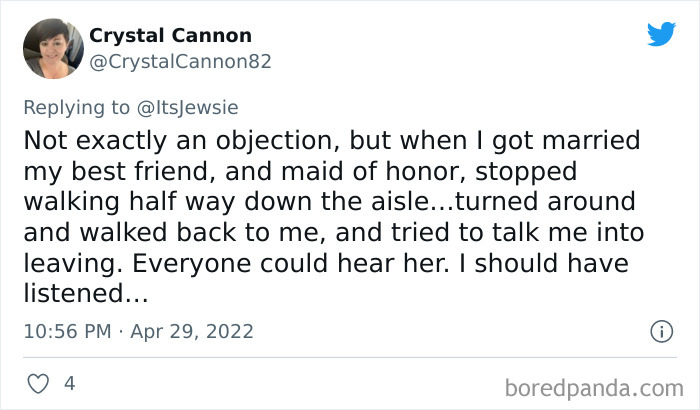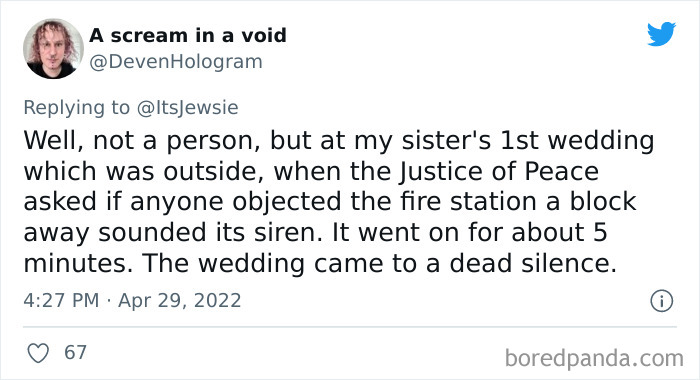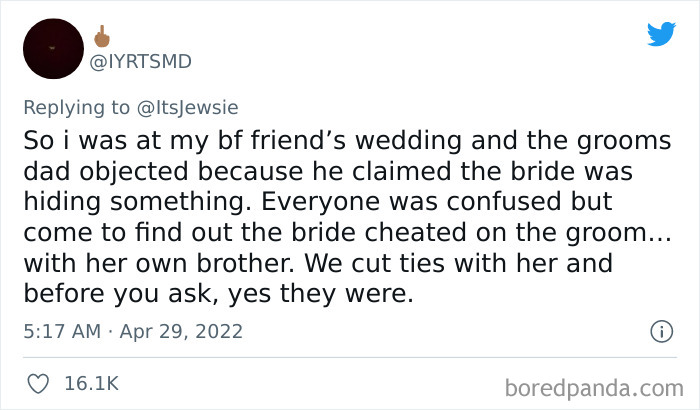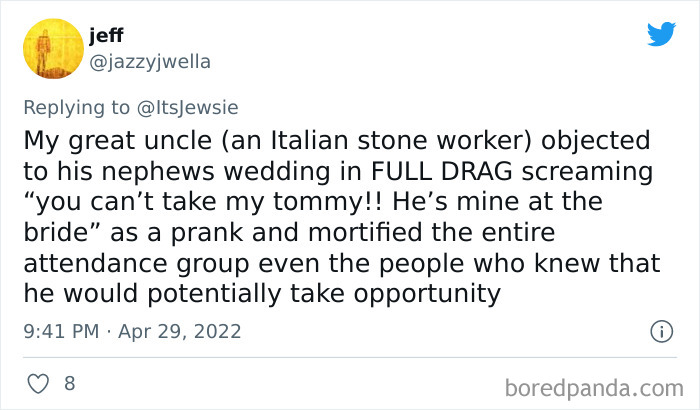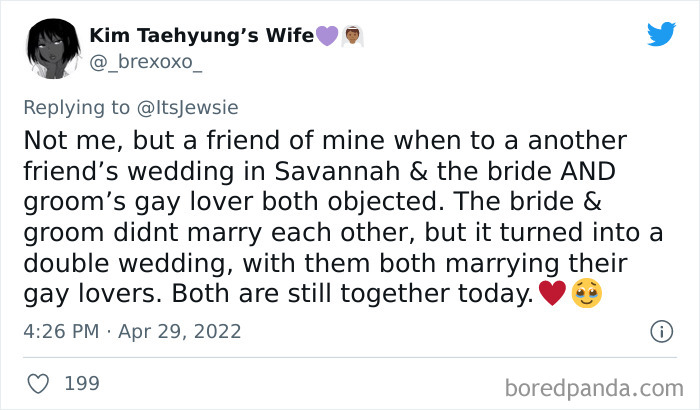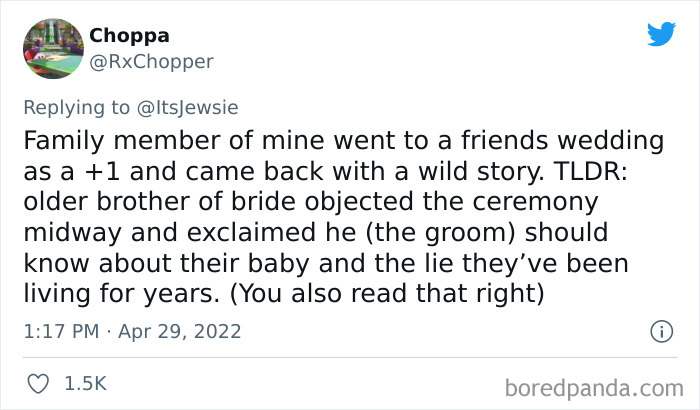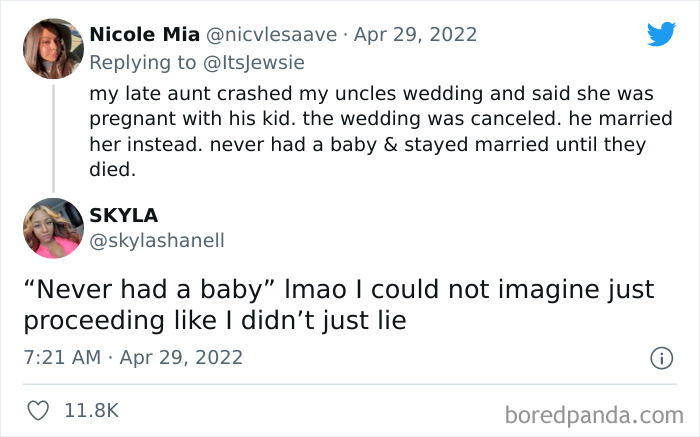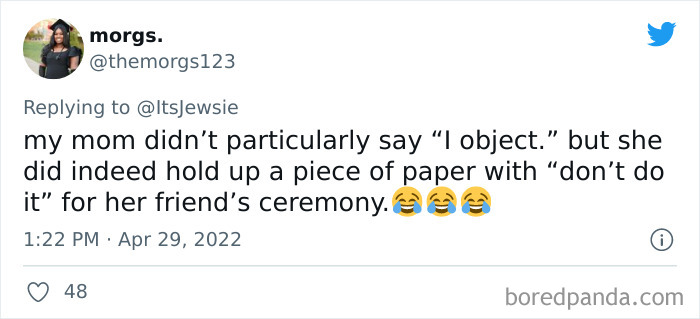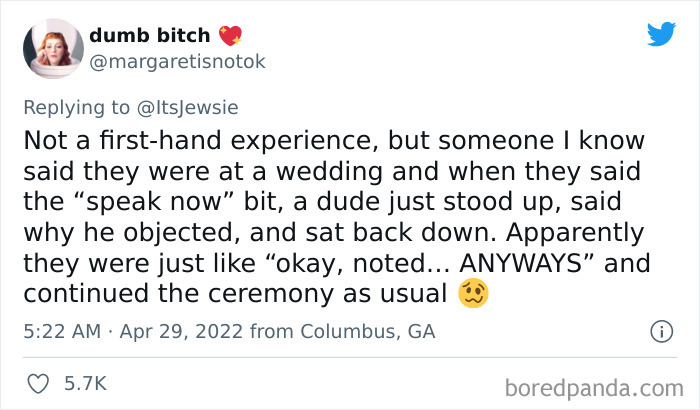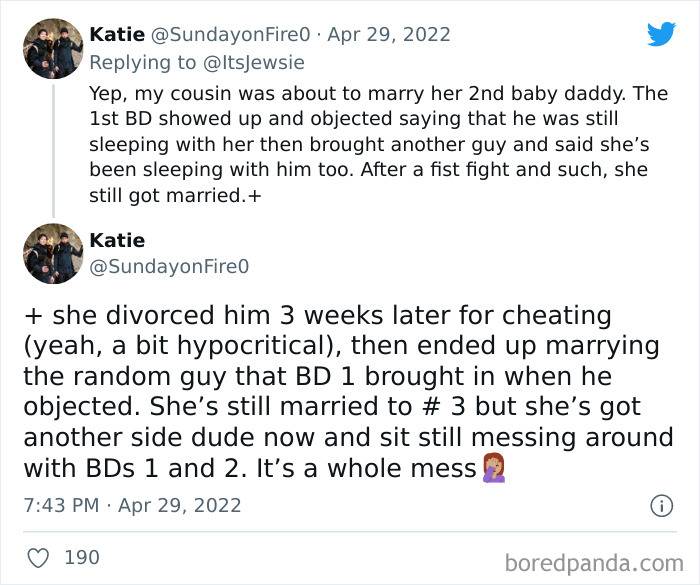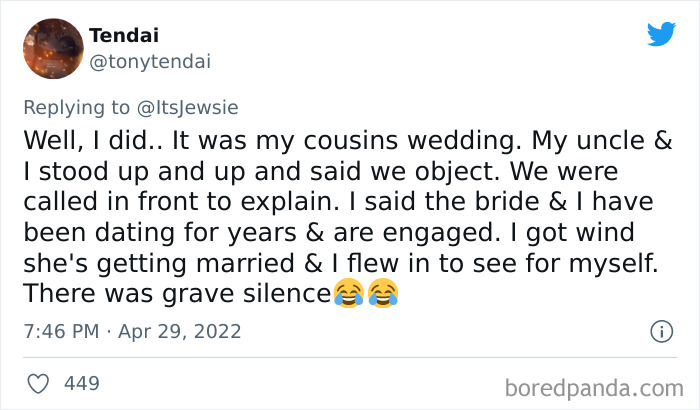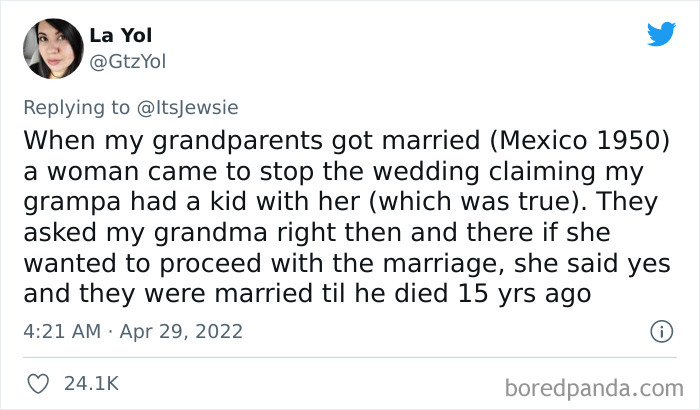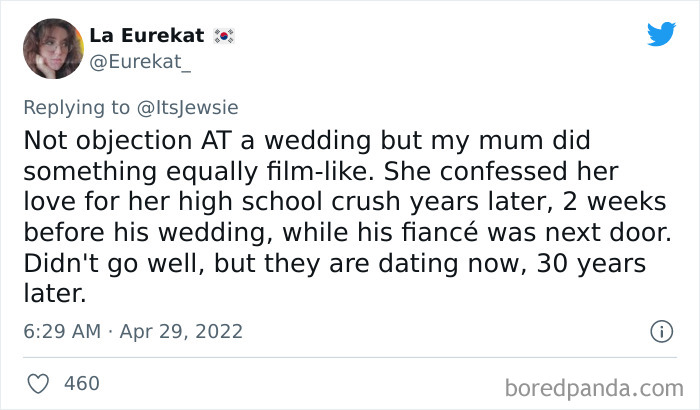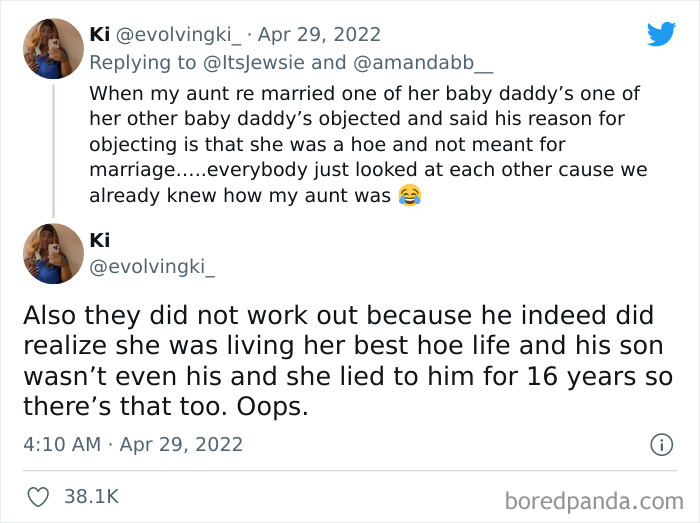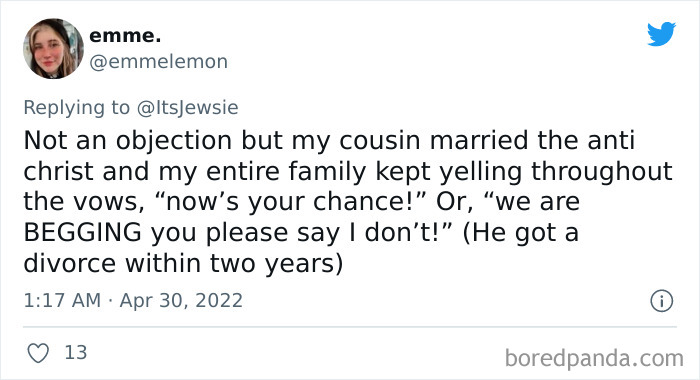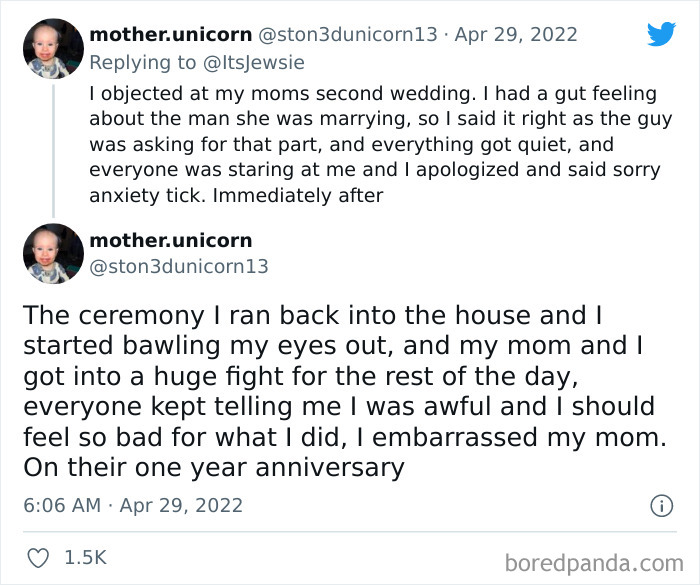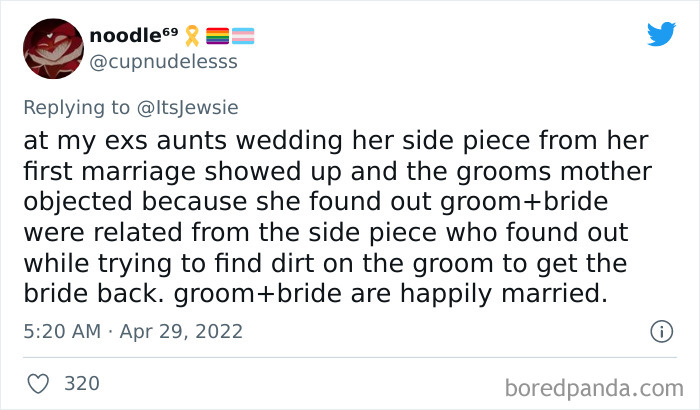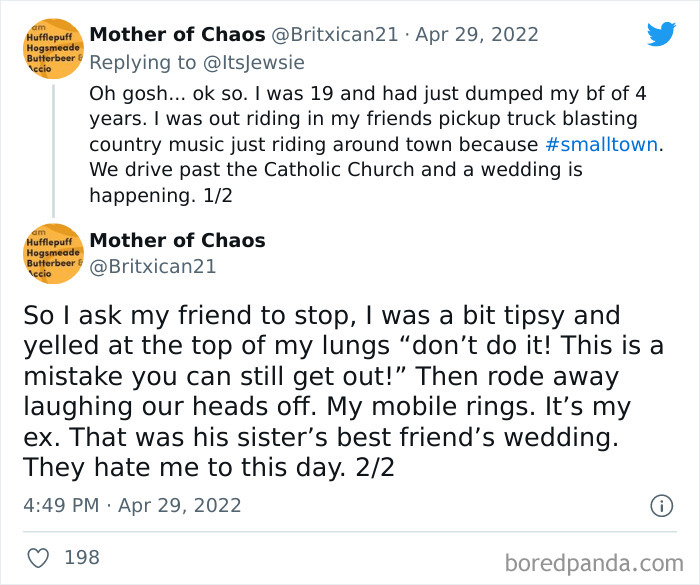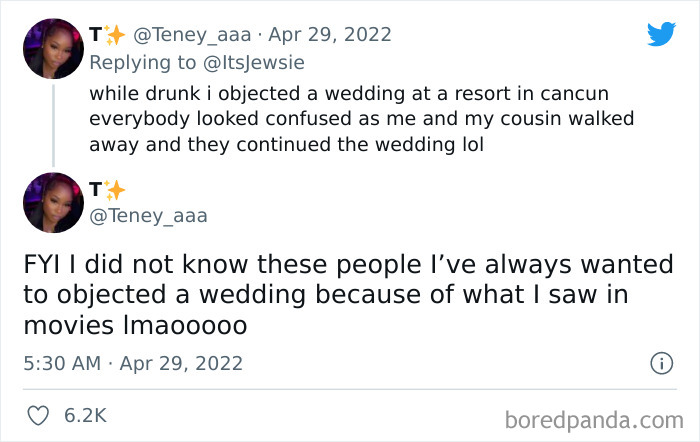Usually, when we think about people objecting during weddings, we think of popular movies or TV shows. Situations like that are so dramatic (and possibly romantic, depending on who you’re rooting for) that it seems like it has to come from a great screenwriter’s imagination.
However, these sorts of objections happen in real-life, too. But they might look very different from what you’ve seen on-screen. Twitter users from all over the world pitched in and spilled the tea about some of the most memorable wedding objections that they’ve ever witnessed, after business owner Sienna asked them to do so.
Sienna, the founder of a lip gloss company called Glosshood, reached a ton of people with the post, and it went viral, netting nearly 302k likes. Scroll down for the best wedding objection stories, upvote the ones that impressed you the most, and don’t forget to tell us all about your own experiences in the comments, Pandas. Just remember, think twice (or even thrice!) before objecting during a wedding yourselves.
Bored Panda got in touch with Anna and Sarah, Team Leaders at The Wedding Society, for a chat about wedding objections, why they fascinate some people, and why they're actually not a good idea in real-life. You'll find our full interview with them below. Remember, just because something looks glamorous on the silver screen doesn't mean that it's what you should do during actual weddings.
More info: Twitter | Glosshood.com
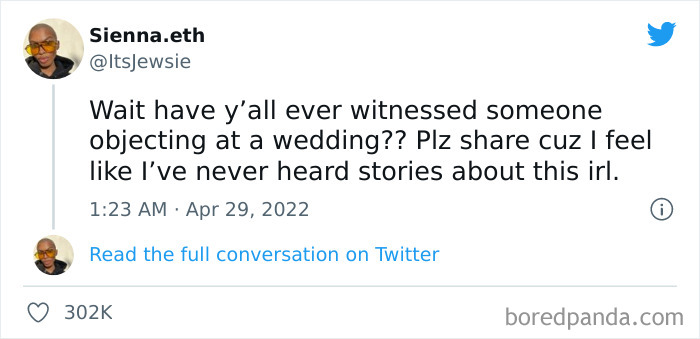 Image credits: ItsJewsie
Image credits: ItsJewsie
This post may include affiliate links.
Anna, from The Wedding Society, told Bored Panda that there isn't such a thing as a real-life wedding objection. "I mean, sure, anyone can stand up mid-ceremony and make an idiot of themselves, but it has no legal bearing on whether the marriage will go ahead or not," she told Bored Panda that someone saying that they object to the union isn't as powerful a gesture as some might think.
"It would simply be a display of emotion from a guest. I guess, the fascination comes from the drama of obstacles when it comes to love," she said.
I assume the twin brother was not at that wedding? Otherwise this would have been cleared up faster.
Bored Panda wanted to understand what someone should do if they notice someone gearing up to interrupt the ceremony and raise objections about the union.
"If a guest is getting geared up to make a scene, there’s really no point," Anna noted that some people simply can't be stopped.
"Plus, it’s incredibly disrespectful to the person or people that the guest claims to care so passionately about. Any uncomfortable chats of concern should have happened well before the moment. So now’s the time to accept the outcome, sit down, keep your hands firmly planted under your butt and enjoy the union," she once again stressed that the ceremony isn't the time to express concerns. It's far too late for that.
I notice that a lot of these objections were raised at *first weddings*. I hope they all chose better partners for their second (and hopefully last) weddings.
Previously, wedding experts Anna and Sarah from The Wedding Society shared with Bored Panda some other insights about objecting during wedding ceremonies.
Generally speaking, it’s not the best thing to do because it can wreck a lot of things. It might all sound romantic on paper, but when you start thinking about what objecting to a marriage actually means, you start to realize that standing up in public and denouncing the relationship might not be the best approach.
I'm a marriage celebrant and in 27 years I've only ever had one couple request the 'obey' word in their marriage vows. It was one sided though, the groom didn't use 'obey' in his vows.
"For anyone thinking of objecting during the ceremony... just don't!! It's never okay to ruin someone's day. All it will do is wreak havoc and draw attention to you—it's selfish and cruel,” wedding experts Anna and Sarah told Bored Panda earlier. There are better ways of expressing your opinion. Ways that don’t put extra pressure on what might actually be a very happy couple.
“If you're genuinely concerned about the union, approach them privately and beforehand with love and respect. If the couple chooses to move forward anyway, respect their decision and do the best you can to support them through their marriage,” the wedding celebrants advised.
However, the experts noted that wedding objections are far rarer in real-life than we see in movies. They really don’t happen all that often.
"Objections mid-ceremony seem to be very rare these days. If a friend or family member has a real problem with the union, it's unlikely that the couple isn't aware of it beforehand!" they told us.
If an objection does occur, however, the couple should do their best to respond appropriately. There’s no need for anger. Try your best to understand where the person is coming from (even if they are messing up your happy day). Whether they’re an ex-partner, a concerned family member, or someone riding in on a white horse.
"It's important to know that any objections are usually coming from a place of care and worry for either party to the union. Objections shouldn't be met with anger, hostility, or defense,” the experts stressed that the couple should try and keep their cool.
I believe the groom was the cousin in this matter. At least, I hope so.
“Instead, it's important to meet them with kindness and love, and where possible, to try and understand where the basis of the objection is coming from,” they said that the couple shouldn’t have to start defending their relationship just because someone’s unhappy with it. It’s not the place nor the time for that.
At the hands of his child, the one he had with the woman in 1950!!!
HOW? Did the fiance and him get married? I still have so many questions.
Way back in the 12th century, the Catholic Church introduced the custom of objecting during a wedding ceremony. The entire point of objections was to make sure that the union was legal.
“Grounds for objection included factors like a party already being married to another, pre-existing vows of celibacy or commitment to the church, being underage without parental consent, or close blood relations,” ‘Brides’ magazine explains.
If there were any objections (all given under oath, of course), the claims would be investigated. Meanwhile, the wedding would be suspended. It was all very serious business. A far cry from the objections we see in film plotlines where it’s not the legality of the union, but a person’s feelings that are prioritized, no?
Just a thought... if you actually knew the person you were getting married to was the actual Anti-Christ, would you still marry them if you were in love with them before finding out? I mean, the Anti-Christ could theoretically give you everything you've ever wanted in life. It's just that, at some point, that person would do questionable things and destroy the world.
Any objections would be given under oath and the officiant would then investigate the situation while the actual wedding was suspended. In short, objections were a very big deal back in the day.
Nowadays, objections tend to be seen more often on the silver screen, in Hollywood movies, than in real life. They’re now less about the legal issues surrounding the marriage and more about one’s personal feelings regarding the union itself.
I honestly can't see the humor in crashing someone else's wedding. I understand the desire because "harhar" but please, it's someones special day. Don't ruin it.
There was this one guy whose dream girl was getting married to some jerk who didn't even love her and was just after her because of her social status, and his friend told him to bust into the wedding when the "does anyone object" part happened. He got there too late, but ran in yelling "I OBJECT!" anyway. It was a big mess, but it all worked out in the end after he confessed his feelings and a dragon ate the groom.
My take: If you object to someone getting married you shouldn't wait until the actual vows to tell them. And if you have tried and they didn't listen, no need to mess up the ceremony.
Exactly. The whole "if anyone object" is seriously outdated & a relic of a bygone era. If there's an actual problem, deal with it beforehand; don't wait for that line. It was intended for back when people lived in smaller communities that might not travel far, and gave a chance for people with select or "secret" knowledge to come forward. For example if the couple were actually related but only Mary knew & wasn't aware they were even a couple until the wedding. Or one of them was already married a few towns over, or wasn't baptized, whatever.
Load More Replies...A marriage is a legal contract. The celebrant, bridesmaid and groom are legal witnesses. (In some religions, including Catholicism, there is a religious wedding separate from a legal wedding.) The question is a legal question, asking if they know of a legal problem with the wedding. No-one is asking if you think the bride is a "s**t," or the groom is a vulgar jerk. The purpose is to determine if anyone knows of prior, unresolved marriages, if the partners are too closely related, etc., and at least formerly, infections, sterility, etc.
I've never been to a wedding when they even asked if there were objections. I don't why these people getting married even included it, as the officiant does go over everything with the couple.
Load More Replies...There was this one guy whose dream girl was getting married to some jerk who didn't even love her and was just after her because of her social status, and his friend told him to bust into the wedding when the "does anyone object" part happened. He got there too late, but ran in yelling "I OBJECT!" anyway. It was a big mess, but it all worked out in the end after he confessed his feelings and a dragon ate the groom.
My take: If you object to someone getting married you shouldn't wait until the actual vows to tell them. And if you have tried and they didn't listen, no need to mess up the ceremony.
Exactly. The whole "if anyone object" is seriously outdated & a relic of a bygone era. If there's an actual problem, deal with it beforehand; don't wait for that line. It was intended for back when people lived in smaller communities that might not travel far, and gave a chance for people with select or "secret" knowledge to come forward. For example if the couple were actually related but only Mary knew & wasn't aware they were even a couple until the wedding. Or one of them was already married a few towns over, or wasn't baptized, whatever.
Load More Replies...A marriage is a legal contract. The celebrant, bridesmaid and groom are legal witnesses. (In some religions, including Catholicism, there is a religious wedding separate from a legal wedding.) The question is a legal question, asking if they know of a legal problem with the wedding. No-one is asking if you think the bride is a "s**t," or the groom is a vulgar jerk. The purpose is to determine if anyone knows of prior, unresolved marriages, if the partners are too closely related, etc., and at least formerly, infections, sterility, etc.
I've never been to a wedding when they even asked if there were objections. I don't why these people getting married even included it, as the officiant does go over everything with the couple.
Load More Replies...
 Dark Mode
Dark Mode 

 No fees, cancel anytime
No fees, cancel anytime 






